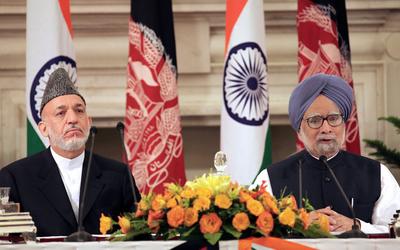in Afghanistan after Western forces pull out in 2014.
So why is Afghanistan important for India?
First, India is invested in the success of the current regime. It has already committed around US$2 billion in developmental aid to Afghanistan, making India one of the country’s biggest donors. In 2011, the two countries signed a Strategic Partnership Agreement, in which India agreed to assist in the training and equipping of Afghan security forces, forces that will eventually take on the Taliban without the support of Western troops.
Second, Afghanistan is important for India’s energy security. Afghanistan is India’s gateway to energy-rich Central Asia — the US$7.6 billion Turkmenistan–Afghanistan–Pakistan–India pipeline is scheduled to start bringing natural gas from Turkmenistan to India by 2017.
Third, a stable Afghanistan is important to India’s security. Several Indian citizens have been killed on duty in Afghanistan, and the Indian embassy in the Afghan capital has had to withstand two attacks, in 2008 and 2009, that brought many casualties. Still, ever since the US invasion of Afghanistan, India’s border province of Jammu and Kashmir has seen decreased militant activity. Before the current war Afghanistan posed a significant danger to India. It was during Taliban rule in 1999, for example, that an Indian Airlines aircraft was hijacked to Kandahar in Afghanistan. India had to release three terrorists in exchange for the hostages.
Fourth, India has a big economic stake in Afghanistan. It owns the mining rights to three of the four blocks of the Hajigak iron ore deposits, west of the capital city of Kabul, and has funded the construction of the 218 kilometre Zaranj–Delaram road in Afghanistan, which gives landlocked Afghanistan access to the sea via Iran. India uses the Iranian port of Chabahar to ferry supplies to Afghanistan because Pakistan refuses to give India access overland to Afghanistan. Chabahar is very close to the Pakistani port of Gwadar, which is now being run by a Chinese state-run firm.
Karzai’s imminent exit has led many observers to argue that a de facto partition of Afghanistan will immediately follow the withdrawal of Western forces. So what will India need to do post-2014?
First, India will have to go back to its tacit backing of anti-Taliban forces in Afghanistan — like the now-defunct Northern Alliance.
Second, it will have to work with countries like Russia and Iran, reviving ties these countries enjoyed in the previous era of Taliban rule between 1996–2001.
Third, India may even choose to team up with China to protect their mutual political and economic interests in Afghanistan. China has concerns about the Taliban because of its huge investments in the Aynak copper mine in Afghanistan in the Logar province and its soft underbelly in the Xinjiang Autonomous Region, which has already been wracked by violence.
Fourth, whether it likes it or not, India will have to open a channel of communication with the Taliban since they will probably be in control of vast swathes of Afghanistan post-2014.
Afghanistan is too important for India not to have a say in its affairs. India can count on goodwill among ordinary Afghans, who generally prefer it to Pakistan. But Pakistan will try its best to ensure India has no say in Afghanistan after 2014 by seeking to revive militancy in Jammu and Kashmir. India will no longer be able to count on the Indian-educated Hamid Karzai for support, since he will complete his maximum two terms in office in 2014, the same year as the Western withdrawal.
India will have to use innovative diplomacy and shed some of its traditional reticence to ensure that it maintains a strong foothold in Afghanistan after 2014. The costs of doing nothing could be very difficult to bear.
Dr Rupakjyoti Borah is Assistant Professor of International Relations at the School of Liberal Studies, Pandit Deendayal Petroleum University, India.
The views expressed are personal.


It is noteworthy that the strategic security agreement that Afghanistan’s national security advisor signed with his Iranian counterpart, coinciding with President Rowhani’s inauguration this week, singles out India and Russia as countries that have important relations with the two signatory powers. It is hard to know what to make of the large number of the ‘strategic’ agreements that Karzai has insisted on concluding over the past year, even flying to Norway on one occasion for a signature ceremony. But he clearly sees Iran, India and Russia as playing key roles in somehow shoring up whatever post-2014 political arrangements emerge in Afghanistan. And he is reported to be ‘in no hurry’ to conclude an agreement with the US, negotiations over which he recently postponed in a huff, as if he didn’t owe his survival in office over the past decade to that country.